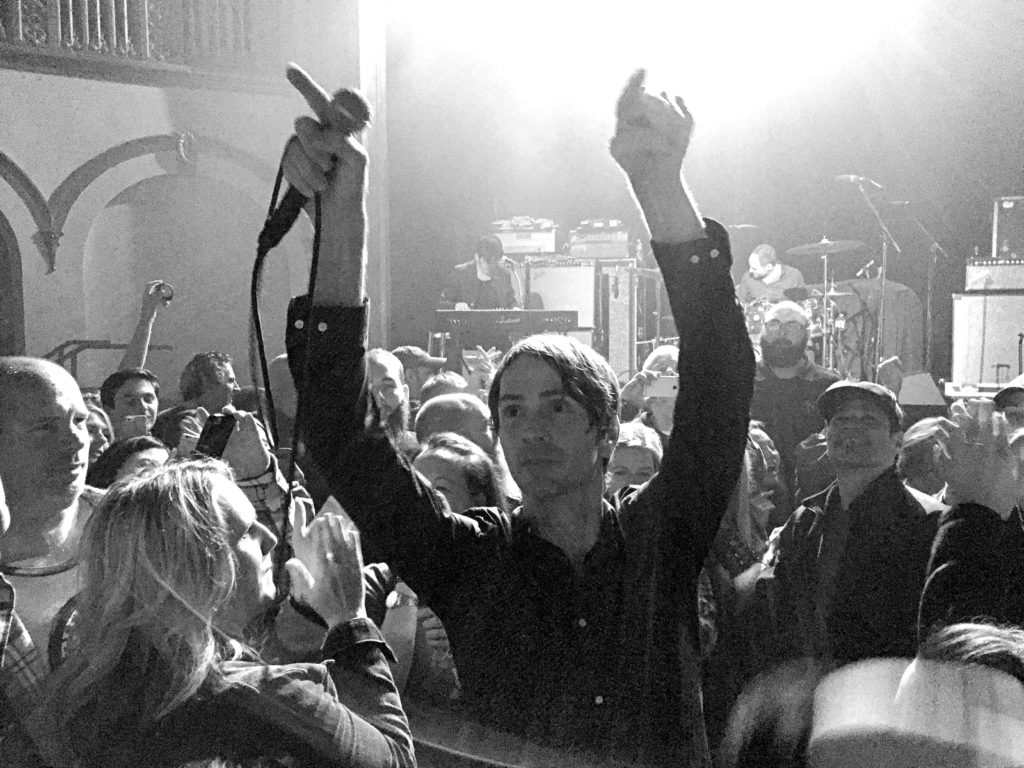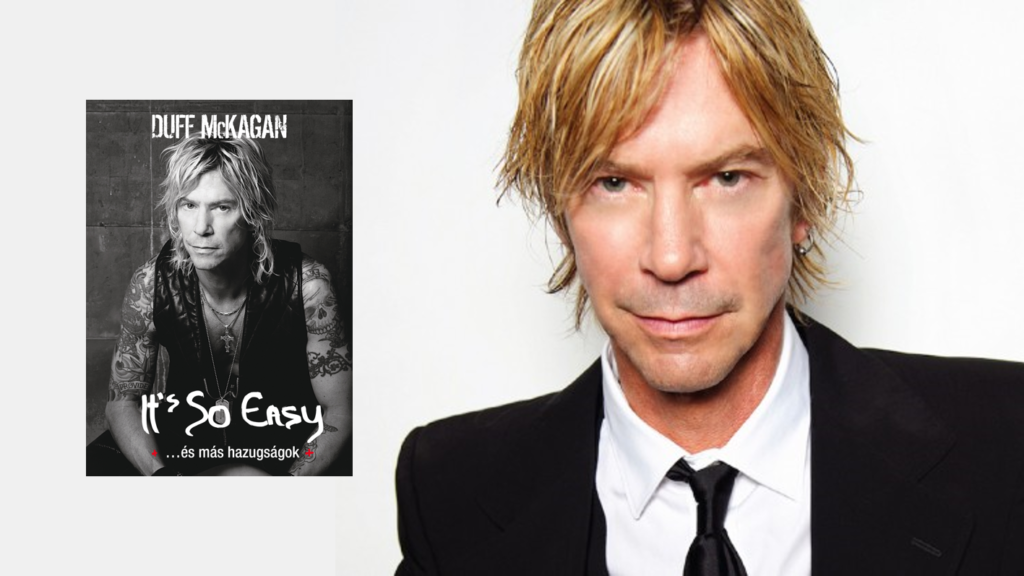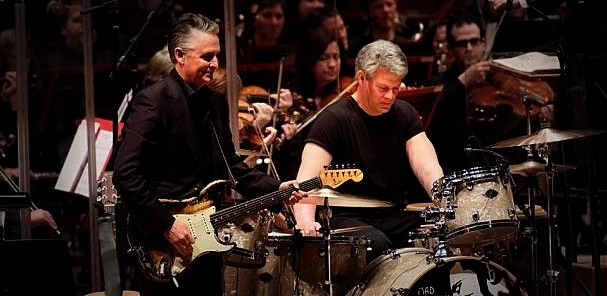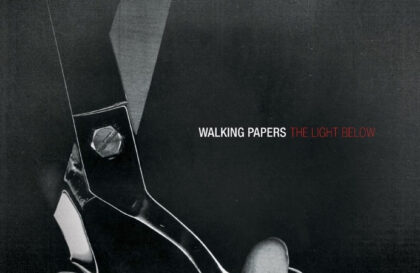Jeff Angell, is one of the greatest and most riveting singers/guitarist of our time. Many know him from Post Stardom Depression, Walking Papers or Staticland but most people became familiar with his name due to the Mad Season show in Benaroya Hall last January. The frontman who comes from Tacoma, Washington (Jerry Cantrell’s hometown), a city near Seattle known for its many military bases met me in Seattle to talk about the early years of his music career, his cooperation with Duff McKagan, Mike McCready and Barrett Martin, the Mad Season show and his experiences about the Alice in Chains and Candlebox tour. Read our in-depth interview below.
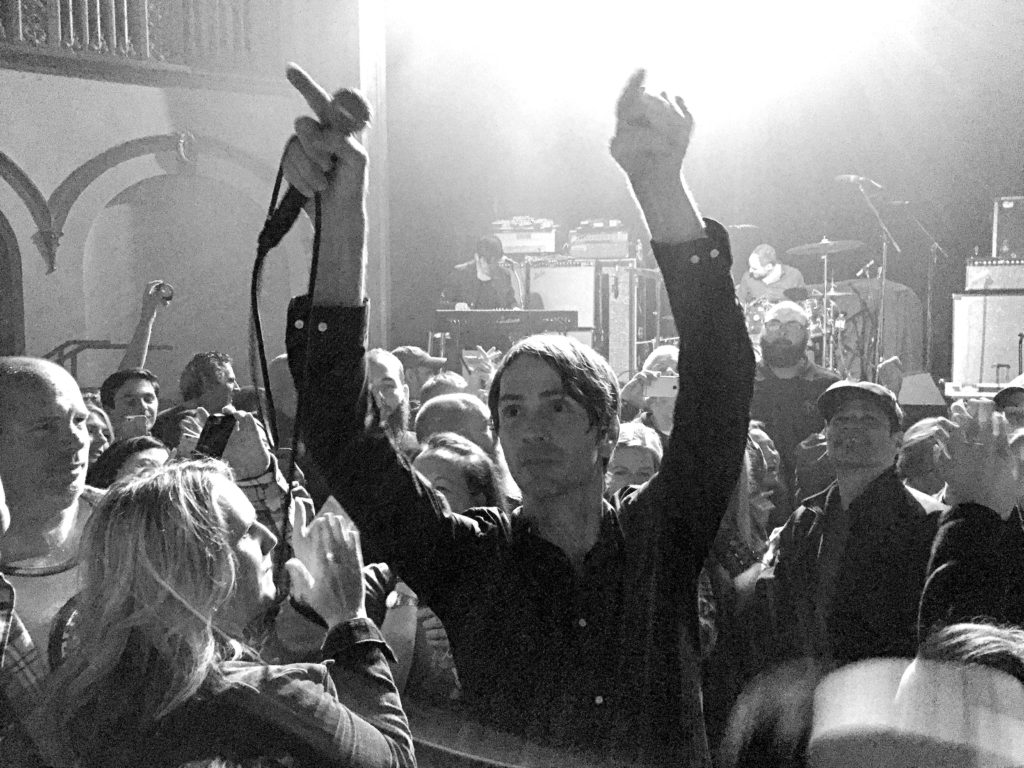 Jeff Angell at Neptune Theatre, Seattle (Photo: Miklós Pintér)
Jeff Angell at Neptune Theatre, Seattle (Photo: Miklós Pintér)
After the Alice in Chains shows, in the middle of the Candlebox tour
How is the tour now?
It’s good. Everybody is getting along really well. I think the fans are super receptive, really energetic, they seem to be into it. It’s clubs mostly which are always my favorite because there’s no barrier, you’re right there with the fans.
You had six shows with Alice in Chains. I think it’s big news for the fans because you are from Tacoma. Jerry Cantrell is from Tacoma and Dave Krusen too.
Oh, really? I didn’t know that part.
Yes, he’s from Tacoma as well. What is it with Tacoma that so many good musicians came from there?
Well, they call it Grit City because it’s pretty gritty. It’s starting to get pretty nice but they have an army base, a navy base and an airforce base all right around there so you get these people from all over. So there’s a lot of riff-raff from the kids and the people that don’t live on the base that wanna cause trouble without the army coming down on them. So that’s kind of where I grew up. It’s like the less attractive, unappreciated stepbrother of Seattle, it’s kind of the armpit of Seattle. And they’ve always had music. Nirvana lived in Tacoma. They came up from Aberdeen and played in Seattle but they never lived in Seattle until after they got famous. Neko Case is from Tacoma, you have the Sonics, you have Seaweed and even Bing Crosby. So definitely, there’s always been music. The Sonics were there before The Stooges, playing kind of garage rock, punk rock. So you might say that it’s not Detroit, it’s actually Tacoma where punk rock was born.
How was the tour with Alice in Chains?
Great. Ben and I have toured with Alice in Chains with the Walking Papers and we get along with those guys really well. After a while, it’s almost like we’re all just in the same band. Their crew is great and they take good care of us. It’s amazing that a brand new little band like us could get right on it. The same with this Candlebox tour.
Do you have a good story from the Alice in Chains tour?
One time on the tour I called San Antonio Austin because we played Austin the day before and I was like ’All right, Austin…’ and they gave me a huge boo. Afterwards Jerry was like ’What was the boo about?’ and I was like ’I called them Austin.’ And he was like ’Oh, I’ve done it like 30 times. It’s the worst when you call them the wrong city. They don’t respond well to that at all. By then we’d already had our show and it went well but it was kind of funny. I’d never done that before. At the end of the tour we all dressed up like roosters. When they played Rooster, we followed them out for their encore and it was hilarious. I wish I could have seen the look on their faces because I couldn’t see through the ridiculous rooster costume. Afterwards they were all having a good laugh about it.
What was the reaction from the crowd about the new songs?
It was good. Some of the shows were seated and that’s always weird. It seemed like they liked it, they bought the record and the T-shirt after the show but it’s always hard to read their energy or get a good vibe off of it when they’re in their seats. So not ideal for a rock show if you ask me but still cool.
That was the question because a lot of people know you from Post Stardom Depression, the Walking Papers and the Mad Season show. Could you please share your story about the Mad Season show with us?
It was really cool to be invited along to sing those songs. I’m a huge Layne fan. When I started, I was a guitar player and then seeing them play live and singing along to those records probably helped me learn how to sing. Although I didn’t try to be him, I tried to be myself. His voice is kind of perfect for a guy like me. It’s just really bluesy and believable, you could feel what he’s singing and I always thought it’s more important to be the most believable singer than the best singer. Mike McCready and Barrett invited me and I got to do the rehearsals…
After the Walking Papers things?
Well, we were making the Walking Papers record and at that time the Guns N’ Roses thing hadn’t come up yet so we were still just being a band. So they invited me. At first I don’t think they knew if Chris Cornell was gonna do it so I thought I might get to do more songs but of course he stepped up and I wouldn’t wanna try to stand in his way, he’s such an amazing singer. The cool part to me after the show was that I don’t really know Stone Gossard or Chris Cornell and after I sang my songs, they walked up to me and said ’Good job. You killed it’. And they knew my name, they said ’Awesome Jeff’ and I was like, wow, they know me. So it was pretty cool to be included and validated by those guys. You can’t ask for more as a Seattle musician I suppose. Because Stone, Chris Cornell and Sean Kinney was there so it was like you’re playing in a sports game and you walked off the field and they all smacked my butt and said ’Good game’. It was really cool.
Early years
You were born in 1973. And you were teenager when the grunge came up from Seattle. Was that your first main inspiration to become a musician?
No, I wanted to be a musician before that. I was really into The Police when I was a little kid. As early as 1st or 2nd grade, I kind of knew I wanna be a musician. I loved the radio and I was always listening to it. The main thing I would do for years was that I would listen to songs and I would change the lyrics and write my own lyrics. So my first experience at writing songs was in the first or second grade. Back then it was all about the army or Star Wars. I put a lot of time into it. You know everybody has their own way of letting their imagination run wild so at that age I just did that. We were kind of poor, I didn’t have any music lessons and it took me a long time to get a guitar, I did a bunch of work and I was pretty committed. So when I actually got the instrument, I started learning from the guitar magazines that would come out every month but I didn’t even know what the songs they had in them sounded like. It’s not like today when you say, ’Hey, I’m gonna learn this song, let’s go and pull up a Youtube’. It was funny because later on I would hear a Carlos Santana song or something and I’d never heard it and I’d go, ’What is that song? I know that song.’ And that would be because I learned how to play through the magazines. I just tried to learn everything. But I guess I always thought you had to move to like California or New York.
Where did you first meet what we now call grunge bands?
In high school, my friend’s older sister’s boyfriend was in a band and they said, ’You wanna go to a show?’ and I said ’Sure.’ So I drove up to Seattle with them and I saw Alice in Chains and Mother Love Bone. Alice in Chains was called Diamond Lie at the time and that was the second show they’d ever played. They had a few original songs and they played a few covers. And the same thing: they were playing covers and I didn’t even know they were covers. So they were playing like David Bowie and stuff like that but I never had those records ’cause I lived way out in the sticks. I mean we didn’t even have record stores. We barely had radio. We had cassettes from like The Ramones and Sex Pistols and I would think that those were bands that were still together. So it was 1986 and I would think, ’the Sex Pistols, they’re kind of cool’ and I had no idea that they’d been broken up for 10 years. So it was not like today when you have the internet and all that kind of stuff.
Which bands were your main inspiration then?
I loved The Rolling Stones, the Ramones and Black Sabbath was a really big thing for me. And some guys went to the city, bought records and would bring them back. When I was a little kid, I didn’t even live in Tacoma, I lived in Lakewood and even further out in the sticks. So when I’d seen that scene, it just blew my mind. I’d seen dudes playing a backyard party playing cover tunes and what not but when I’d seen that these bands had their own songs they basically showed me a map to the universe. It’s like you have a map but you’re missing some pieces and they came and popped the pieces down. So what you do, you start writing some songs, you get some guys. By then I kind of knew how to play guitar and things started to happen. Once I realised that scene existed, I started to go to all those shows, I started meeting people and then I put together my own little band and I only played two shows before some manager stole me out of the band and put me in a band with a bunch of older guys. I moved out three weeks before I turned 15 and I moved in with a bunch of older dudes.
You were very young then, still at school, right?
My nickname at the time was Junior because I was so young. But I was tall so if I had my hair in my face, I could pass for older. I could play the guitar better than a lot of the older guys and eventually I was in a band that opened up for Alice in Chains and Soundgarden which to me was a very big deal. I knew a manager guy who put me into the band, he would book a show and he could choose who the openers were and that’s how I got on to those shows and that’s how I first made contact with those guys. At the time those guys were around 25 and they were running around chasing chicks and they probably didn’t want some fifteen-year-old kid following them around telling them how great they were. So I just kind of played it cool and kept my mouth shut. I just kept slugging it out and eventually I was opening for Jane’s Addiction and Alice in Chains and all my favorite bands. I got to play a lot and toured with Dee Dee Ramone and the Queens of the Stone Age and all these other people in between them. And we never got to that level. It took a lot of time to get to touring with Aerosmith or those big bands. It’s like one of those things, you always wanna open the present on Christmas Eve but if you do, Christmas is kind of a bummer. So the waiting just made it all the more valuable. I’m actually really happy about how it all turned out. They kind of hit the golden years of rock and roll when those guys made a lot of money. There’s not a lot of money in music any more but I was never doing it for the money anyway. I never even thought about that.
You do it for joy.
Yeah, I did it for the joy. If I was trying to do something for money, there are ways of making money that are a lot easier than rock and roll.
It’s interesting because I wrote a review about the Staticland record and I think that was the album of 2016.
Really?
I have questions about three songs.
I’m happy to answer them for you.
The last one on the album is ’Let the Healing Begin’. I feel some Mark Lanegan things…
I’m a fan.
…I love it because I love Mark Lanegan. I think it is something that takes your music to a new level. What was the inspiration for that song?
You know what’s funny about Mark Lanegan is that his Winding Sheet album to me is my Seattle record. It came out before Alice in Chains had their record. It was on Sub Pop. And the Screaming Trees were a few years ahead of that. We had that cassette, we had Nirvana Bleach. So around here it was a really big deal that these bands had real records. Sub Pop was doing a real thing here. If you were in a band, of course you wanted to listen to them and you’d become obsessed and wanted to figure out how you can make your own records. That first Mark Lanegan record was my soundtrack for like two years. I loved it. This was before MTV’s Unplugged and stuff so he was way ahead of his time. If you listen to those chord progressions, they are really basic ’cause he’s not a guitar player. And sometimes people try so hard to put some fancy riff in there, when they do, it makes it harder for the vocals to connect with the chord progression. I probably learned something from that. When I wrote Let the Healing Begin, I had recently lost three friends to substance abuse and I think some of that stuff and the song just kind of arrived. I was in the practice room and after everyone left I was like ’I’m gonna screw around with some ideas’ and it was really easy, I just started playing and most of the song was there instantly. It’s really rare when a song happens like that. When it does, I know it’s a special song. I don’t know if we’re playing it tonight but when we play it live, it’s still really small but then it gets huge, it’s almost like Pink Floyd. And on the record, it’s just the guitar and the piano. And that’s a live take as well, the vocals, the guitar and the piano, all in one take, there’s no overdubs on that song.
My second favorite is The Cure or the Curse. It feels like the previous song and this one are one song without a break. This is the Led Zeppelin, Deep Purple and Black Sabbath level. I feel something special in that song.
In the performance or in the lyrics? In the words or in the music?
Both.
Well, I know that when I played that guitar solo, I had a lot going on at home. I was in Nashville and I’d be on the phone trying to work out all these problems and there was nothing I could do, I couldn’t go see anybody and the producer was like ’Okay, come on in and let’s do the song’. So I put it all on that song. My girlfriend doesn’t like guitar solos so much, she’s like ’Just get to the rock,’ she’s kind of a punker from when she was a kid but I was saying to her, ’I think you should listen to this guitar solo ’cause I think it will probably tell you more about who I am than I could tell you with words. We should have put that song on the CD. It’s on the vynil but it’s not on the CD. And you can download it on Spotify. That seems to be people’s favorite when we play live. It’s funny because we only play a 30-minute set when we open up for Alice in Chains, maybe 45, and we play two songs that aren’t even on our record.
I think there are fantastic guitar solos both in Band Aid on a Bullet Hole and High Score but I feel that I need more. I’m not a punk, I’m from the hard rock and metal side.
Well, that’s what I say, I always want more guitar solos. Do you think that in Walking Papers and Missionary Position there was a lot of guitar solo?
Yes, there was.
Sometimes, I get a little tired of hearing myself play. And on this record, there are definitely some songs, like Phantom Limb or The Edge that don’t really have a guitar solo. But a lot of times when a band doesn’t know how to write a bridge, they just throw in a guitar solo, it’s almost like the go-to thing if you can’t write a bridge. So we were trying to write real bridges, maybe next time we should have both. My argument can be when we make the next record that everybody likes The Cure or the Curse so we should have more guitar solos. Or I need to get people sign a petition that says more guitar solos.
I’d like to ask about your relationship with Ben. I read an article that although the name of the LP is Jeff Angell’s Staticland, it’s not a solo project.
Yeah, I don’t really feel that way.
You are old friends.
He was in a rival band when we were kids. We were both in industrial bands for a while. We met back then, we were both fans of each other’s but he was doing his thing, I was doing my thing. When we did the first Missionary Position, he had a studio set up in his house. He started recording some of my stuff and he just kind of made his way into the songs and it became our thing and then we started writing songs together for that album. The same thing with the Walking Papers. I started that with Barrett but I just couldn’t imagine doing it without Ben. So when this record label wanted to put out a second Walking Papers record but then the Guns N’ Roses thing came up, that was put on hold. They said ’Why don’t you just do a solo record?’. I think they wanted to use my name because they thought the Walking Papers fans would be able to find it easier which maybe some of them do, some of them don’t. Some people like a band and they don’t know what the name of the singer is, they just like the band. So they wanted to put my name on it and I really didn’t want to. I understood why they wanted to. Jeff Angell’s Staticland was kind of a compromise. If you search Staticland, you know how it works. And it makes some things a little more complicated but that was the only way we could think about getting what we wanted. I’m not a solo artist kind of guy. I always feel that things are better when you get other people’s opinions. I don’t know if there’s such thing as a solo album, someone’s still recording it, someone’s still playing drums on it. I think it’s all just marketing.
I think it’s a very friendly viewpoint. I like it.
We work really well together. I’m pushing, he’s pulling. I’m tension, he’s release. He’s really into details and I’m kind of a big picture guy. That’s how we usually work together. I like the blues, he tends to keep it from sounding like a white guy blues record. He makes it a little darker so it’s cool.
You worked with Jack Endino on Ordinary Miracles. Jack is a legend.
Yeah, he’s a legend for sure. With that record, we didn’t have enough money to go to the studio but we knew we wanted to get a producer. We had a Pro Tools rig in our room and we said ’We’d like to work with you but we can’t afford you and we can’t afford a studio’. And because he was a believer he made our record in our practice room with us. I think he liked the idea of coming down there and doing it right in our practice room. In the process, he taught us how to do it. So the next record we did after that, the Post Stardom and both of the Missionary Position records, we did in the same practice room. We did the drums on three Missionary Position songs at Robert Lang’s ’cause we just wanted to try it. And I think you can definitely get some things from a big studio. I think if you know how to record it, record it, but you need a pro studio to mix it. Don’t mix it in a box and don’t mix it at home, get a big guy to mix it in a fancy studio.
You did the Staticland record with Vance Powell in Nashville.
That was the first time I’d ever made a whole record in a big studio. With Walking Papers, we did all the drums in the studio but then I took it home and did the guitars and vocals at my house. We did the second Walking Papers record in Josh Homme’s studio from the Queens of the Stone Age. That was the first time I did a record in a studio but I still recorded the vocals and the solos at home. And with this Nashville record, the thing is, we went down there but we did like three songs on the Staticland album in our practice room and recorded the other ones at the studio and by the time a pro guy mixes it, you can’t tell which ones were done where.
It was unimaginable to make a record at home in the early nineties.
But that’s what Jack was doing. The studio they recorded Bleach in wasn’t a fancy studio. I’ve been there, it’s a tiny little studio. But today some guy has something in his bedroom that he bought from a guitar center, it’s a better studio than we had back then. So these days there’s really no excuse…
Is it true that you have new songs for Walking Papers? And you’re just waiting for Duff to finish the Guns N’ Roses thing?
We have a full finished album with 17 songs. I’d like it to come out ’cause I like the songs but right now I can’t do it. I can’t put out a record that competes with the Staticland record. Probably the closest thing that I’ve ever made to a solo record was the first Walking Papers record. A lot of those songs were my songs before I even knew Barrett. We practised 6 times and we made that record. A lot of the songs are songs that I had but didn’t use on the Missionary Position record. At the time I just thought the other songs were better. So I had these leftover songs and we made up a few, kind of jamming. The second Papers record was really the record that sounds like Ben, Barrett, Duff and me. We wrote more of those songs together. The first Walking Papers record is definitely closer to a solo album than Staticland. Staticland is more the three of us working together. Walking Papers was mostly my songs with Barrett playing along then Duff added his bass later. But the second Walking Papers record the one that no one’s heard is more of a Walking Papers record. I would like people to hear it because I think Barrett and Duff add an amazing rhythm section and it’s an album that’s not like any other album I’ve made because of their influence on it. People’s perception of how a record happens and how it went down, is not always true. They shouldn’t ruin the magic, it doesn’t really matter. Same thing when people imagine The Rolling Stones are in the studio, playing live like a rock band and sometimes you find out, it’s two different drummers on the same song and they cut it in the middle, you know what I mean? But who cares as long as it sounds good when you’re listening to it. People probably imagined that with the first Walking Papers record. Duff didn’t even come until the whole thing was done. In the first printing, he only plays bass on three songs. And when they re-released it, he added his bass to the whole record.
Why did Duff join the band?
Well, we just asked him to come down and play on a couple of songs as a friend. Then he asked us if we were doing shows because he wanted to jump in and we said ’of course’. The record was done and we played two shows, just Barrett and me. And when we played the third show, he joined in and Ben joined in after that. Ben played on I’ll Stick Around and he played some organ on Capital T. It was just friend’s adding to the music. Hell, Mike McCready could have joined also if he wanted to.
I was talking about the tone of your voice with some musicians. They and I both feel some Ian Astbury from Cult and Jim Morrison in it. Do you agree with that?
Really? Well, Ian Astbury wants to be Jim Morrison and when I was in school and we had reading assignments I wasn’t interested. When the librarian said ’You can pick out anything you want’. I picked No One Here Gets Out Alive about the Doors. In that book I learned about all the beat writers, William Burroughs, Jack Kerouack, Norman Mailer and all those guys. I learned about jazz, John Coltrane and the blues guys, all in that book. That book just opened my mind. Then I went back to the library and asked if they had Naked Lunch. And they’d be like ’You’re in the 7th grade, why the hell are you asking for Naked Lunch?’. And like I was saying earlier, some kids had cassettes from the Doors and I was listening to that and I was obsessed with it. You’re 12 or 14 years old and you’re going through puberty and Jim Morrison is your tour guide out of puberty into manhood which should be rock and roll 101 for anybody who wants to sing in a rock band. A little bit after that I got turned onto the Cult. Because I could play Cult songs on the guitar and I could sing along to Wildflower and Lil Devil. Ian, like Layne kind of taught me how to sing. That’s how I realised that I could sing and that I have the same range he does. Some of the Alice in Chains stuff that I tried to sing, Layne can go a little bit higher than I can with my natural voice. Ian Astbury is just right there, it’s kind of a perfect spot for me to be. So I’m kind of his illegitimate child. The Cult was a huge influence. We had Billy Duffy came to one of our shows and it was really cool to have one of my heroes out there in the audience.
Is Billy your fan?
I don’t know, I mean I hope so. I have a picture that someone took. He’s sitting there and watching me play guitar. And it’s one of my favorite photos of all time.
You had some shows with Candlebox in Europe in January. What is the next step?
We’ve already started writing songs and we have some songs that are left over from the album that we might rework. We definitely have a good 6 songs that we didn’t put on this record. I’m really excited about the new songs ’cause I always wanna raise the bar as well as try some things I haven’t tried before. And also playing with Josh, with the first record we kind of figured out how we worked together and now I think we kind of see what our strengths and weaknesses are. We try to shine the light on our strengths and sweep the weaknesses under the carpet.
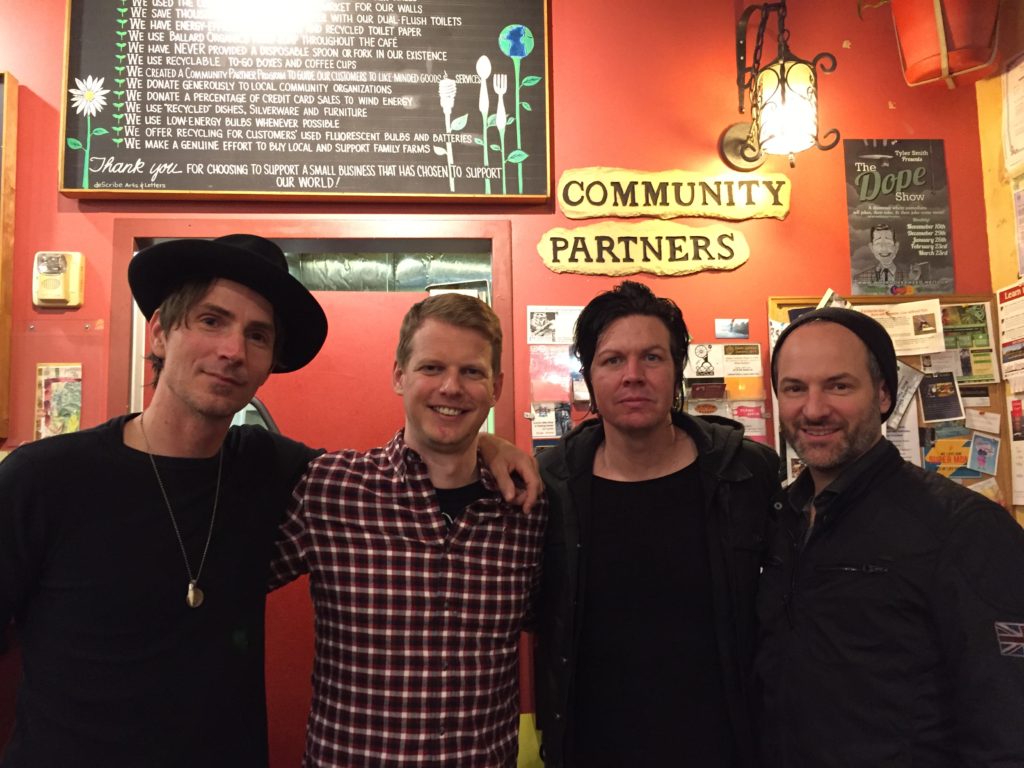 Jeff Angell, Miklós Pintér, Ben Anderson, Josh Fant (Photo: Grungery.hu)
Jeff Angell, Miklós Pintér, Ben Anderson, Josh Fant (Photo: Grungery.hu)

